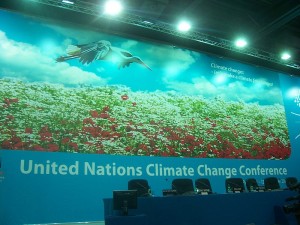UN conference on climate; a long way to go to achieve the desired results
Friday, December 16th, 2011 9:51:40 by Fayyaz Yaseen
UN conference on climate; a long way to go to achieve the desired results
Durban; the UN conference on climate organized Durban, although was regarded successful by the participants, but remained failed to achieve satisfactory results.
A package of accords includes an agreement which gives a new lease of life to the 1997 Kyoto Protocol that committed only industrialised countries to legally binding emissions target.
Notably, the world’s biggest polluter, the US, never ratified the Kyoto, and hence is under no such obligation.
The accord expires next year, and has now been extended for another five years.
An important achievement of the conference is a new deal under which all principal polluters, including rapidly growing economies like China and India – excluded under the Kyoto accord – are to accept legally binding emissions targets in the future.
That though is going to be a slow, time-consuming process.
Talks on the issue are to begin next year, and culminate in 2015; it will be another five years, ie, in 2020, before a new deal comes into effect.
Scientists have been warning for nearly a quarter of a century of impending global warming, urging governments of developed countries to curb greenhouse gas emissions, and reverse them to a point where the rise in global average temperature since the pre-industrial
era is below 2C.
For long those governments remained in denial of the phenomenon.
Climate change has now started to manifest itself in frequent extreme weather events – recurring in Pakistan as well as other parts of the world in all ferocity.
The problem demands urgent action.
All major polluters must act quickly to make deep cuts in carbon emissions so the 2C target can be achieved.
Unfortunately, however, the country with the biggest carbon footprint, the US, is still reluctant to become an active participant in international climate action although President Obama remains a vocal champion of a cleaner environment.
Congressional leaders are concerned more about promoting the profits of corporations than protecting the environment.
Yet led by the US, the developed countries put forward a plan at Durban that sought to bind all countries equally to emissions reduction commitments.
As usual, fast-growing economies like China, India and Brazil balked at the idea, pointing out that the Western nations have gotten where they are after nearly 200 years of unrestrained industrial activity, which has caused so much harm to the global environment;
they therefore have a greater responsibility to address the problem.
Also, as a press report notes, most emerging economies have volunteered to limit greenhouse gas emissions.
Tags: brazil, China, climate, Durban, India, Kyoto, results, UN Conference, USShort URL: https://www.newspakistan.pk/?p=6387

















